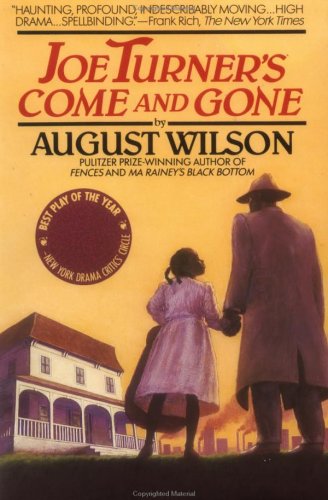The year is 1911. The place is a boardinghouse in the Pittsburgh Hill District run by Seth Holly, a son of Northern free parents, and his wife Bertha. Here, men and women, having migrated from the South, try to find meaning in their lives. Amidst the muscular dynamics of a Northern steel city, “marked men and women” seek to shape “the malleable parts of themselves into a new identity as free men [and women] of definite and sincere worth.”
Joe Turner’s Come and Gone, the second in August Wilson’s ten-play cycle dramatizing the realities of the African-American experience in the twentieth century, resonates with its lyricism and its vision. Grounded in the everyday language of men and women who have arrived from a very different place, Joe Turner’s Come and Gone nevertheless transcends the trivial or ordinary to delve into the core experience of human kinship. What binds people together? What compels them to love each other? What makes them remember how to sing their song?
With unforgettable characters that are distinctive in voice and manner and temperament, Joe Turner’s Come and Gone asks you to question not only the existential choices the characters make but also your own. Bynum Walker, a conjure and rootworker—the one you will want to give a standing ovation to—sings the Binding Song because he sees people walking away and leaving each other. With his words and voice, he uses the power of his song and binds them together. As he says of himself, he is like the glue “that sticks people together.”
Rutherford Selig, known as the People Finder, peddles Seth Holly’s pots and pans up and down the Monongahela River and writes the names of buyers on a list he uses to find those who are lost. Through Selig, Herald Loomis, a man who has lost his balance, finds his wife Martha Loomis Pentecost and in the end she and their daughter Zonia are reunited. Having spent four years looking for Martha and seven years before that under the slave driver Joe Turner, Loomis cannot stand on his own two feet. Through the power of his Binding Song, Bynum helps Loomis regain his balance in the world. As Bynum tells him: “See, Mr. Loomis, when a man forgets his song he goes off in search of it…till he find out he’s got it with him all the time.”
Mattie Campbell, Molly Cunningham, Jeremy Furlow, residents of Seth and Bertha’s boardinghouse—all are trapped outside themselves searching for a way back in. These are men and women struggling against themselves, fighting against their own breath, biting back against their own song.
When I saw Joe Turner’s Come and Gone on Broadway in 2009, I was completely engaged in the nuanced transformation of these characters. In the formidable grip of life, unrecognizable to themselves, they are seekers on the road either because of confusion or trauma or ignorance or the weight of history. They ask of us: How shall we hold ourselves responsible for our presence in the world? In one of his transcendent monologues, Bynum answers: If he (Bynum) ever sees the shiny man again, the One he is looking for, he “would know that my song had been accepted and worked its full power in the world and I could lay down and die a happy man.”
I highly recommend seeing Joe Turner’s Come and Gone if it’s ever staged in your area. And if not, read the play. It’s 86 pages long, and you will be transported, and maybe, transformed by these characters and August Wilson’s brilliant writing. This is a play of extraordinary beauty—both human and theatrical.
Joe Turner’s Come and Gone was first performed in 1986 at the Yale Repertory Theatre. It was performed at the Arena Stage in Washington, D.C., in 1987 in a Yale Repertory Theatre production. In 1988 it was performed at the Ethel Barrymore Theatre and in 2009 at the Belasco Theatre on Broadway in New York City.



